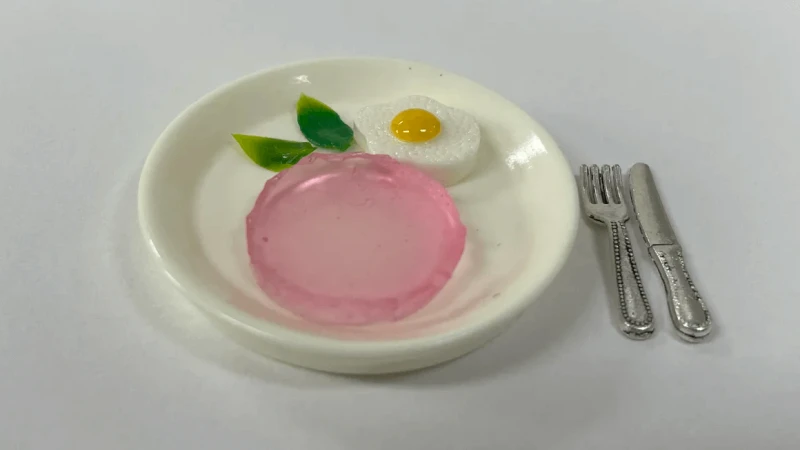Pink Jello or lab grown meat ingredient? Improved 3D scaffold mimics flavor and aroma of grilled beef
Pink Jello or lab grown meat ingredient? Improved 3D scaffold mimics flavor and aroma of grilled beef


Researchers in South Korea say they’ve developed a new way to make lab-grown meat taste like the real deal. It may look like a transparent, bubble gum pink-colored disc, but scientists hope it could revolutionize the meat on people’s plates.
Scientists have created everything from cultured meatballs to 3D printed steaks. While some previous iterations of cultured beef have mimicked the look and feel of the real thing, according to a new study, they’ve overlooked a key element: taste.
But in the study, published [July 9] in the journal Nature Communications, researchers say they have cracked the code, developing a cultured meat that generates “grilled beef flavors upon cooking.”
“Flavor is the most important thing to make cultured meat be accepted as real,” Milae Lee, a co-author on the paper and a PhD student in the Department of Chemical and Biomolecular Engineering at Seoul’s Yonsei University told CNN.
To mimic the taste of conventional meat, Lee and her colleagues recreated the flavors generated during the Maillard reaction — a chemical reaction that occurs between an amino acid and a reducing sugar when heat is added, giving a burger that delicious, charred taste.
They do this by introducing a switchable flavor compound into a gelatin-based hydrogel, to form something called a functional scaffold, which Lee described as the “basic composition of the cultured meat.”
This is an excerpt. Read the original post here

 | Videos | More... |

Video: Nuclear energy will destroy us? Global warming is an existential threat? Chemicals are massacring bees? Donate to the Green Industrial Complex!
 | Bees & Pollinators | More... |

GLP podcast: Science journalism is a mess. Here’s how to fix it

Mosquito massacre: Can we safely tackle malaria with a CRISPR gene drive?

Are we facing an ‘Insect Apocalypse’ caused by ‘intensive, industrial’ farming and agricultural chemicals? The media say yes; Science says ‘no’
 | Infographics | More... |

Infographic: Global regulatory and health research agencies on whether glyphosate causes cancer
 | GMO FAQs | More... |

Why is there controversy over GMO foods but not GMO drugs?

How are GMOs labeled around the world?

How does genetic engineering differ from conventional breeding?
 | GLP Profiles | More... |

Alex Jones: Right-wing conspiracy theorist stokes fear of GMOs, pesticides to sell ‘health supplements’




 Viewpoint — Fact checking MAHA mythmakers: How wellness influencers and RFK, Jr. undermine American science and health
Viewpoint — Fact checking MAHA mythmakers: How wellness influencers and RFK, Jr. undermine American science and health Viewpoint: Video — Big Solar is gobbling up productive agricultural land and hurting farmers yet providing little energy or sustainabilty gains
Viewpoint: Video — Big Solar is gobbling up productive agricultural land and hurting farmers yet providing little energy or sustainabilty gains Fighting deforestation with CO2: Biotechnology breakthrough creates sustainable palm oil alternative for cosmetics
Fighting deforestation with CO2: Biotechnology breakthrough creates sustainable palm oil alternative for cosmetics Trust issues: What happens when therapists use ChatGPT?
Trust issues: What happens when therapists use ChatGPT? 30-year-old tomato line shows genetic resistance to devastating virus
30-year-old tomato line shows genetic resistance to devastating virus California, Washington, Oregon forge immunization alliance to safeguard vaccine access against federal undermining
California, Washington, Oregon forge immunization alliance to safeguard vaccine access against federal undermining The free-range chicken dilemma: Better for birds, but with substantial costs
The free-range chicken dilemma: Better for birds, but with substantial costs ‘You have to treat the brain first’: Rethinking chronic pain with Sanjay Gupta
‘You have to treat the brain first’: Rethinking chronic pain with Sanjay Gupta
